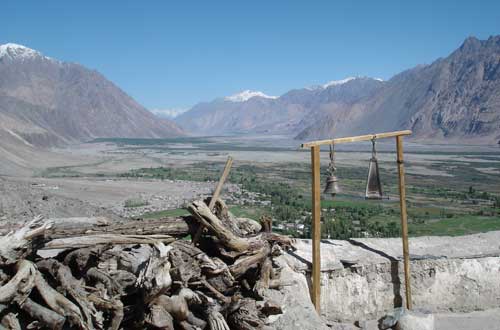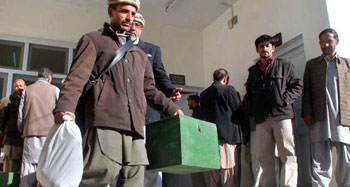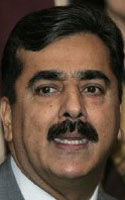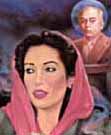SWEDISH SOUTH ASIAN STUDIES NETWORK
Pakistan
 Area:
796.095 sq km.
Area:
796.095 sq km.
Population:159,196,336 (est. July
2004). Official figure 2002: 144.6 Millions. Azad Kashmir –
the part of Kashmir controlled by Pakistan – with approximately 2
million people not included. The same thing applies to the large contingent
of Afghanistan refugees still living in Pakistan.
Independent: August, 14, 1947.
Republic: Since March, 23, 1956.
National Anthem: Blessed be thou
sacred land by Abdul Asar Hafeez Jullundhuri (text) and Ahmad Chagla
(music)
Religion: Muslims 97 p.c. (Sunnis
77 p.c. and Shias 20 p.c.), Hindus 1,6 p.c., Christians 1,3 p.c..
Languages: Punjabi 48 p.c, Sindhi
12 p.c, Siraiki 10 p.c, Pashtu 8 p.c, Urdu (official State language) 8
p.c., Balochi 3 p.c, Hindko 2 p.c, Brahui 1 p.c; English, Burushashki
and other languages 8 p.c.
Population growth: 1,98
p.c. (est. 2004)
Life expectancy: 62,61
years (est. 2004)
GDP Purchasing power parity: USD 2,100 (est. 2004)
Exports commodities: Textiles
(garments, bed linen, cotton cloth, and yarn), Rice, Leather goods, Sports
goods, Chemicals, Manufactures, Carpets and Rugs
Administration Pakistan is a federal state, consisting of four provinces:
Punjab
Baluchistan
Sindh Khyber-Pakhtunkhwa (K-P) 
(formerly known as the North Western Frontier Province, NWFP)
plus Areas under direct Central administration:
• The Capital city of Islamabad,
• The Federally Administered Tribal Areas,
FATA, along the border to Afghanistan,
 • The Northern Areas – the districts
of Gilgit, Hunza and Skardu, which until 1947 were parts of the Maharaja
state of Jammu & Kashmir. On September 7, 2009, President Asif Ali Zardari of Pakistan signed what was called the Gilgit–Baltistan Empowerment and Self-Governance Order 2009, purporting to introduce administrative, political, financial and judicial reforms in the Northern Areas of Pakistan which has been under Pakistani control since 1947-48 after local people sided with Pakistan in a uprising against the Dogra ruler. The order re-names the Northern Areas as the Province of Gilgit-Baltistan. Provincial Assembly elections were held on 12 November 2009. More information.
• The Northern Areas – the districts
of Gilgit, Hunza and Skardu, which until 1947 were parts of the Maharaja
state of Jammu & Kashmir. On September 7, 2009, President Asif Ali Zardari of Pakistan signed what was called the Gilgit–Baltistan Empowerment and Self-Governance Order 2009, purporting to introduce administrative, political, financial and judicial reforms in the Northern Areas of Pakistan which has been under Pakistani control since 1947-48 after local people sided with Pakistan in a uprising against the Dogra ruler. The order re-names the Northern Areas as the Province of Gilgit-Baltistan. Provincial Assembly elections were held on 12 November 2009. More information. ![]()
plus – as a separate administrative entiety: Azad (”free”) Kashmir.
The Pakistani Parliament consists of two chambers, the National Assembly (with 392 seats, out of which 292 are elected in general elections, and 100 candidates chosen from religious minorities and representing women); and the Senate, whose members are chosen by the four provincial assemblies.
| The Parliamentary term ended on 15 November 2007, and new general elections for both the national and the provincial assemblies were held on 18 February 2008. The opposition parties PPP and PML(Nawaz) won a landslide victory, well ahead of President Musharraf’s party PML (Q). The voters also strongly rejected the Muttahida Majlis-e-Amal party, which was voted out of power in the North Western Frontier Province (NWFP). More information about the election results. |
General parliamentary and provincial elections were held on 18 February, 2008. Final results to the National Assembly elections:
• Pakistan Peoples Party Parliamentarians, PPPP – 121
(led by Asif Ali Zardari)
• Pakistan Muslim League (Nawaz), PML (N) – 91 (led by Nawaz Sharif)
• Pakistan Muslim League (Quaid-e-Azam), PML (Q) – 54
(led by Chaudhry Shujaat Hussain)
• Muttahida Qaumi Movement, MQM – 25 (led by Altaf Hussain)
• Awami National Party (ANP) – 13
• Muttahida Majlis-e-Amal, MMA – 6 ¢
• Pakistan Muslim League (Functional) – 5
• Balochistan National Party (Awami) – 1
• National People's Party (NP) – 1
• Pakistan Peoples Party (Sherpao) –1
• Independent candidates – 18Totally 342
(272 general seats + 60 women’s seats and 10 for minorities)
¢
Muttahida Majlis-e-Amal is an alliance headed by Maulana Shah Ahmed Noorani,
leader of Jamiat Ulema-e-Pakistan – the political representative
of the Barelvi school of Sunni Muslims. The coalition has in its fold
both factions of the pro-Taliban Jamiat Ulema-e-Islam, which represents
the Deobandi school, Professor Sajid Mir's Jamiat-e-Ahle Hadith and Allama
Sajid Naqvi's outlawed Shia group Tehrik-e-Jafria Pakistan. But the motivating force
behind the formation of the MMA is one of the country’s most organised
political parties, the Jamaat-e-Islami.
Constitution: The President should
be elected by the members of both Houses of Parliament, plus the provincial
assemblies; whereas the Prime Minister should be elected by members of
the National Assembly. Azad Kashmir officially
has its own parliament as well as own president.
 |
 |
| President Asif Ali Zardari (left) and Prime Minister Yousuf Raza Gillani. | |
President since 6 September 2008: Asif Ali Zardari (Pakistan People’s Party, PPP). Zardari is the widower of former Prime Minister Benazir Bhutto.
He succeeds Pervez Musharraf who resigned from the presidentship on 18 August 2008 ahead of coming impeachment proceedings.
Prime Minister: Yousuf Raza Gillani, vice chairman of Pakistan People’s Party (PPP). He was nominated by PPP, with the support of coalition partners, Pakistan Muslim League (N), Awami National Party, Jamiat Ulema-e-Islam (F) and Muttahida Qaumi Movement on 22 March 2008, and took the oath of office from President Pervez Musharraf on 25 March 2008.
 Recent history: Through a peaceful
coup in October 1999 the then Chief of the Armed Forces General Pervez
Musharraf deposed the elected Prime Minister Nawaz Sharif (Pakistan
Muslim League).
Recent history: Through a peaceful
coup in October 1999 the then Chief of the Armed Forces General Pervez
Musharraf deposed the elected Prime Minister Nawaz Sharif (Pakistan
Muslim League).
Sharif had won a landslide victory in the elections to the National Assembly
in 1997, but he was after the military takeover accused of plane hijacking
and attempted murder and was put in front of an anti-terrorist tribunal.
In April, 2000, he was sentenced to prison for lifetime, narrowly escaping
a death penalty. In December the same year he was however permitted by
the military regime to leave the country for Saudi Arabia where he now
lives in exile. As a precondition Sharif had to promise he would not engage
in politics in Pakistan for the coming 10 years.
 The
other major politician of the 1990’s has been Benazir Bhutto
(Pakistan People’s Party), who also was forced to resign from the
office of Prime Minister in 1996, after severe accusations had been raised
against her concerning economic offences. From 1998 she lived in
exile in England and Dubai, as she was convicted for bribery and
would land in jail if she stayed on in Pakistan, but in October 2007 she returned to Pakistan.
The
other major politician of the 1990’s has been Benazir Bhutto
(Pakistan People’s Party), who also was forced to resign from the
office of Prime Minister in 1996, after severe accusations had been raised
against her concerning economic offences. From 1998 she lived in
exile in England and Dubai, as she was convicted for bribery and
would land in jail if she stayed on in Pakistan, but in October 2007 she returned to Pakistan.
Benazir Bhutto was assasinated in Rawalpindi on December 27, 2007.
The self-proclaimed President Musharraf legitimised and prolonged his
presidentship with five years by winning a landslide victory in a highly
controversial Referendum on the issue, on 30 April, 2002. After making
a deal with the Muttahida Majlis-e-Amal Musharraf in December 2003 he
was also finally given an approval by the parliament on the same issue,
still sidelining the main opposition parties.
In October–November 2003 peace initiatives were taken by both Pakistan
and India, on upgrading diplomatic relations and resuming traffic by flights,
trains, buses and ferries between the two neighbouring countries. This
was followed by a SAARC meeting in Islamabad in January 2004 which included
fruitful top meetings between President Musharraf and the Indian Prime
Minister Vajpayee.
On 6 October 2007 a Presidential election was held. As expected, General Musharraf won by a landslide.
He won all but five of the votes cast in parliament's two houses and swept the ballots in the four provincial assemblies, election officials said. Opposition MPs abstained or boycotted the vote, calling it unconstitutional.
But his supporters dominate the assemblies, thanks to elections five years ago which were widely condemned as rigged.
The results depend, however, on the Supreme Court decides upon the legality in the presidential election.
On 18 October, the ex-PM Benazir Bhutto returned to Pakistan from years of self-imposed exile. This was possible after a deal was announced in early October, meaning that the court cases against her will be closed. As a result, members of her Pakistan People's Party (PPP) did not join the opposition boycott against holding the presidential election, but abstained from voting.
Also former Prime Minister Nawaz Sharif recently returned to Pakistan from his exile in Saudi Arabia, taking up a political fight against President Musharraf.
In the elections held on February 18, 2008, the opposition parties PPP (now led by Benazir Bhutto’s husband Asif Zardari) and PML(Nawaz) won a landslide victory. Following the election, which as promised by Musharraf is considered the most transparent and fair in the history of the country, President Musharraf conceded the defeat of his party and pledged to work with the new Parliament. The leaders of the two parties now discuss forming a coalition government. Such a government could force President Pervez Musharraf from power.
| More information on Pakistan |
Wikipedia, the free encyclopedia, Pakistan
BBC News Country Profile Pakistan
The Human Development Report 2009 data on Pakistan
The Library of Congress, USA, offers through its Country Studies Web site detailed Information on all Aspects of Countries round the Globe. Look for Pakistan. Information contained in the Country Studies On-Line is not copyrighted and thus is available for free and unrestricted use by researchers. As a courtesy, however, appropriate credit should be given to the series. Unfortunately, though, the information on Pakistan is not updated since April 1994.
World Bank Group/Pakistan: Data reports, publications, statistics, projects etc, for Pakistan
CIA – The World Factbook: Pakistan
Official website of the Islamic Republic of Pakistan.
pakistani.org. Site under construction by Shehzaad Nakhoda and Zartash Uzmi, Stanford, USA; offering assorted historical and judicial material of national importance, including the Constitution of Pakistan.
Balochvoice – Baloch struggle of self-determination. News and debate around the development in the Province of Balochistan. Web site 2001-2005 known as balochonline.com, but in January 2006 sabotaged by opponents, restarted on 23 January 2006 as Balochvoice.
The British Foreign & Commonwealth Office (FCO) advice on safety aspects on travelling to Pakistan
The Swedish Government’s Division for Democratic Issues, based at the Ministry of Justice, regularly publishes reports about the human rights situation in countries all over the World. Read the 2007 Report on the Human Rights Situation in Pakistan (in Swedish only).
SASNET - Swedish South Asian Studies Network/Lund
University
Address: Scheelevägen 15 D, SE-223 70 Lund, Sweden
Phone: +46 46 222 73 40
Webmaster: Lars Eklund
Last updated
2010-05-21
